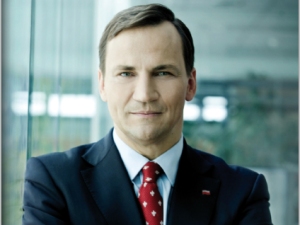 This is the third in a series of articles discussing potential candidates for the position of United Nations Secretary-General. The current holder of the post, Ban Ki-Moon of South Korea, is perfectly within regulations to stand for a third term when the 2016 election comes around; however, if he were to be successful, he would become the first UN Gen-Sec to survive more than two stints in office, and therefore history is against him. Previous articles have proposed the divisive Serb and current President of the UN General Assembly Vuk Jeremic (http://wp.me/p3g0mz-1g) and UN Development Programme leader and ex-Kiwi Prime Minister Helen Clark (http://wp.me/p3g0mz-1l), both of whom have proven international reputations. This piece highlights a third candidate, Polish Foreign Minister Radoslaw (or Radek) Sikorski, a journalist-turned-politician with a personal hunger for power.
This is the third in a series of articles discussing potential candidates for the position of United Nations Secretary-General. The current holder of the post, Ban Ki-Moon of South Korea, is perfectly within regulations to stand for a third term when the 2016 election comes around; however, if he were to be successful, he would become the first UN Gen-Sec to survive more than two stints in office, and therefore history is against him. Previous articles have proposed the divisive Serb and current President of the UN General Assembly Vuk Jeremic (http://wp.me/p3g0mz-1g) and UN Development Programme leader and ex-Kiwi Prime Minister Helen Clark (http://wp.me/p3g0mz-1l), both of whom have proven international reputations. This piece highlights a third candidate, Polish Foreign Minister Radoslaw (or Radek) Sikorski, a journalist-turned-politician with a personal hunger for power.
Candidate III – Radoslaw Sikorski
The Pole, unlike Jeremic and Clark, ticks all the important boxes. Namely, he hails from the next logical area of the globe (Eastern Europe) to be represented in the Gen-Sec role; and he is well and truly ‘in with the big guns’, i.e. the Security Council, who importantly still hold the power to veto candidates (similar to the format of recent elections in the Islamic Republic of Iran). Sikorski has been sourcing Western allies since he was a student; he read PPE at PembrokeCollege, Oxford, where, somewhat trivially, he was a member of the elitist Bullingdon Club – along with other prominent politicians. Since studying, the Pole has worked for several broadsheet newspapers, including the Observer and the Telegraph, both in Britain and overseas; he reported from Afghanistan during the war against the USSR. Before returning to Poland in 2005 to enter domestic politics, Sikorski spent time in the American world of Think Tanks, networking to great effect and creating a platform from which to launch a personal campaign. That campaign could get underway sooner rather than later.
Polish Foreign Minister
In 2007, after two years of political turmoil, Sikorski found a home with the Civic Party and was sworn in as Foreign Minister. In conjunction with the fact that Poland is the only European country to increase its defence spending since the global financial crisis, Sikorski has gone about diplomatic business in a rather pragmatic fashion, building and strengthening relationships with Germany and Russia, before seeking an increased role for his country in the workings of NATO, which Poland joined in 1999. He also implemented effective reforms to modernise the infrastructure of the Polish Foreign Ministry, to maintain the international relations he has built. Analysts have commented that Sikorski’s talent for diplomacy has been a significant factor in Poland’s relatively strong economic performance over the last few years (steady at between 3-4% growth in real GDP) – the foreign minister has sought economic unity with Germany, a useful ally in a time of uncertainty for the Eurozone that surrounds Poland in many senses. He has also strengthened relations with Britain, recently speaking on the UK as the future leader of Europe as a political and economic entity – a view that Sikorski’s ex-Bullingdon pals might well take on board if the Pole jumps to the top of the United Nations.
Personal Ambition
Sikorski will undoubtedly be hungry for more personal power, and will certainly stand for the UN Gen-Sec role if he gets the chance. There was considerable talk of him abandoning Poland’s ambitions in NATO to take up the General-Secretary role within the very same organisation himself back in 2009. Unfortunately for Radek, ex-Danish Prime Minsiter Anders Fogh Rasmussen assumed that particular vacancy. However, Sikorski’s position is better set this time around. He would leave Poland diplomatically competitive; he himself is four years more experienced in international politics; and the global community is pointing more and more to Eastern Europe as a hunting ground for new world leaders. Hence, Vuk Jeremic of is likely to be a strong competitor – it is Sikoski’s relationship with the West that will benefit him vis-à-vis the Serb.
Conclusion
The only issue with Sikorski is his rather realist attitude to war and the armed forces. In that sense, perhaps the Gen-Sec role in NATO would suit him better that its opposite number in the UN. Regardless, the Pole may have to prove himself on the humanitarian development front to fight off other candidates such as Clark, which will be tricky given her particular experience in that field. As the Eurozone crisis reaches boiling point, so Poland’s diplomatic position will be determined, and perhaps it is then that Sikorski will ultimately prove himself. Either that, or he will burn out, and the bookies will be forced to continue scouring ex-Soviet states for prominent politicians.
Bibliography
Neil Buckley, ‘Foreign Policy: Poland eyes lead EU role despite Euro delays’. Financial Times, 22/03/201
‘Sikorski in Oxford (Again)’. Economist, 23/09/2012

Reblogged this on louisdubois55.